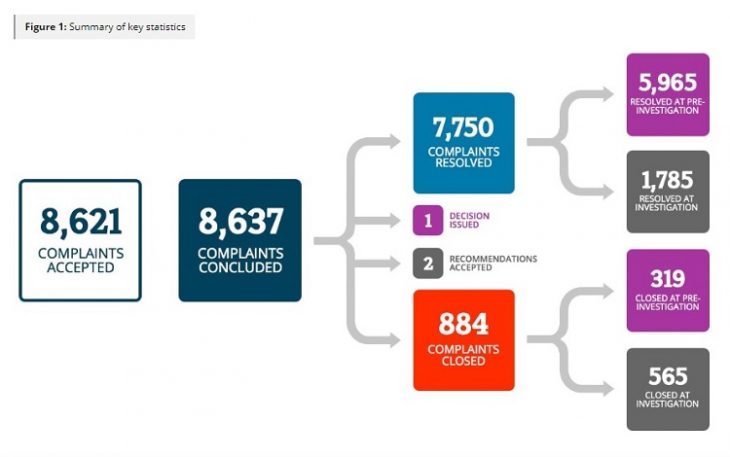
OTTAWA — The Commission for Complaints for Telecom-television Services (CCTS) reported early Tuesday a 12% decrease in the number of complaints it received from Canadian telecom and TV customers between August 1, 2019 and January 31, 2020, following a 44% increase for that same six-month period last year.
The CCTS accepted a total of 8,621 complaints in the time frame and resolved 90% of all complaints. There were 46 confirmed wireless code breaches, five TV service provider code breaches and three deposit and disconnection code breaches.
The main contributors to the decline were Cogeco and Bell, with Cogeco recording a 75% decrease in complaints (the prior spike was for previously reported reasons), while Bell reported a 26% reduction. Telus also had a 7% decline in complaints during the period. Despite the overall decline, complaints about Fido and Rogers increased by 29% and 6%, respectively, according to CCTS’s 2019-20 Mid-Year Report. (All comparisons are to CCTS’s 2018-19 Mid-Year Report.)
“We’re pleased to see that customers are increasingly able to fix their problems directly with their service providers, and we’re here to help those customers who are not able to do so,” said CCTS Commissioner Howard Maker, in the news release. “It’s clear that companies and organizations across the country are dealing with unprecedented challenges at this time and we’re all working hard to meet the demands.”
Canadians complained most often about their wireless service (44.2% of all issues raised), followed in order by Internet (26.5%), TV (14.5%) and local phone (13.5%). The most frequently raised concerns were “disclosure issues”, the majority of which involved a mismatch between what the customer was expecting and what they received, followed by complaints regarding the accuracy of amounts billed (“incorrect charges”), according to the CCTS report.
The CCTS also reported breaches of the Wireless Code decreased by 25%, to 46 violations down from 61 reported the year before, with the most common Code violation involving the failure by a service provider to give the required notice before disconnecting service.
“These pre-pandemic statistical results indicate that some service providers are paying attention to the issues brought to us by their customers and adjusting the way they do business,” said Maker. “This is a step in the right direction.”
The CCTS administers all four the CRTC’s codes of conduct, including the new Internet Code, which took effect on January 31, 2020.




